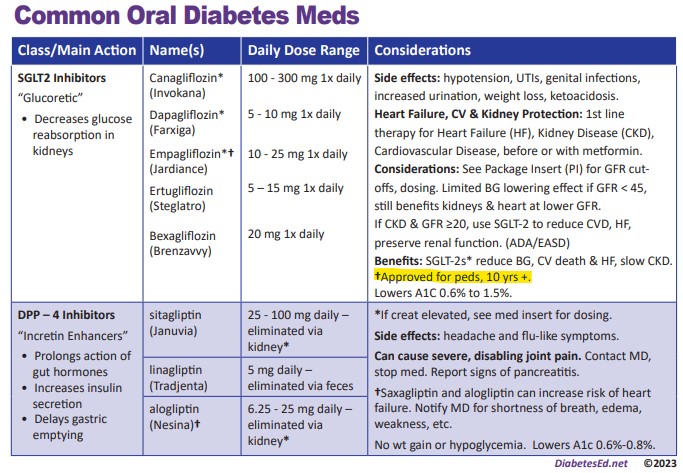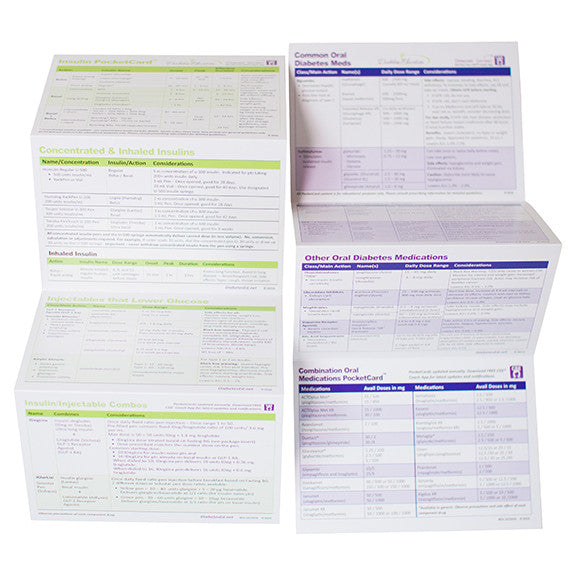July 2023 eNews | New Diabetes Certification Info & Meds Update

Celebrating 25 Years
We love putting together our monthly newsletters. Even though they are a lot of work, they give our team a chance to share important clinical information and connect with our community of diabetes advocates and educators.
For this 25th year edition, we look at new requirements to renew your CDCES, recently approved medications for pediatrics, and the importance of emotional connection to decrease diabetes distress.
To celebrate our 25th anniversary, we are taking $100 off our most popular bundles through July. Plus, we are including a limited edition 25-year sticker in each product purchase. Keep an eye out for more swag in August too!
I am looking forward to connecting LIVE in person with you at the National ADCES meeting where I will be presenting on, “Strategies to Revitalize Your Diabetes Program.” Plus, our team is providing a LIVE three-day training program in San Diego in October.
There is nothing like being together in person to make those meaningful connections and I can’t wait.
My goal for the next decade is to keep giving back to my community. To package and share what I have learned over the past quarter of a century as an educator and CEO with all of you. I can’t think of anything more important than opening doors and sharing information with the next generation of diabetes professionals.
We encourage you to apply for our Diabetes Scholarship and challenge yourself with our Question and Rationale of the Week.
We hope you are keeping cool and we look forward to the next decade of ongoing connection.
With gratitude and appreciation,
Coach Beverly and Bryanna
Featured Articles
- Important CDCES Cert Renewal Updates
- Empagliflozin Now Approved for Peds
- Diabetes Ed combined with Emotions has Bigger Impact
- DiabetesEd Scholarships
- Question of the Week
- Rationale of the Week
- Prep for CDCES FREE Webinar
Upcoming Events – See the complete calendar listing
Rationale of the Week | Diabetes & Hospital Standards
The use of DES products does not guarantee the successful passage of the CDCES exam. CBDCE does not endorse any preparatory or review materials for the CDCES exam, except for those published by CBDCE.

For last week’s practice question, we quizzed participants on in-patient diabetes care. 42% of respondents chose the best answer. We want to clarify and share this important information, so you can pass it on to people living with diabetes and your colleagues, plus prepare for exam success!
Before we start though, if you don’t want any spoilers and haven’t tried the question yet, you can answer it below: Answer Question
Question: JR was admitted to the hospital with an infection and newly discovered diabetes. To get glucose to ADA target range for hospitalized individuals, JR was started on 12 units of basal insulin plus bolus insulin with meals. JR experienced a morning BG of 87 mg/dL, so the provider decreased the basal insulin to 9 units. JR’s morning blood sugar the next day was 157 mg/dL.
What is the best action?
Answer Choices:
- Increase basal insulin by 10- 20%.
- Intensify correction scale.
- Continue with same basal dose.
- Ask MS if they are snacking during the night before making adjustments.
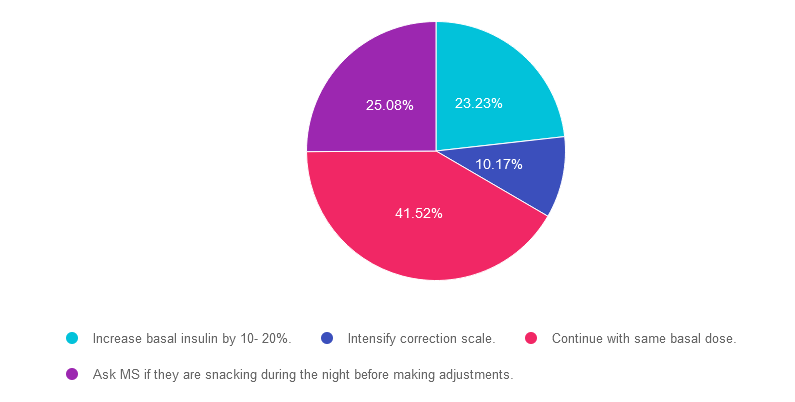
Getting to the Best Answer
If you are thinking about taking the certification exam, this practice test question will set you up for success. Test writers anticipate possible answers based on the details in the question. They will wave those “juicy answers” right under your nose. Your job is to weed through the particulars, pluck out the most important elements and choose the BEST answer.
Answer 1 is incorrect. 23.23% chose this answer. “Increase basal insulin by 10- 20%.” This is a juicy answer because we typically consider the target glucose range 80-130 fasting and before meals. However, according to ADA Standards, the target glucose range during hospitalization is 140-180 mg/dL in general, and 100-180mg/dL in the non-critical care setting. Based on these inpatient goals, we wouldn’t need to increase basal insulin since JR’s morning glucose of 157 is right on target.
Answer 2 is incorrect. 10.17% of you chose this answer. “Intensify correction scale.” Another juicy answer because we typically consider the target glucose range 80-130 fasting and before meals. However, according to ADA Standards, the target glucose range during hospitalization is 140-180 mg/dL in general, and 100-180mg/dL in the non-critical care setting. Based on these inpatient goals, we wouldn’t need to intensify the correction scale since JR’s morning glucose of 157 is right on target. In addition, correction insulin doesn’t have much impact on fasting glucose. That’s the job of basal insulin.
Answer 3 is correct. About 41.52% of respondents chose this. “Continue with same basal dose.” YES, this is the BEST answer. According to ADA Standards, the target glucose range during hospitalization is 140-180 mg/dL in general, and 100-180mg/dL in the non-critical care setting. Based on these inpatient goals, we wouldn’t need to intensify the basal insulin since JR’s morning glucose of 157 is right on target.
Finally, Answer 4 is incorrect. 25.08% chose this answer. “Ask MS if they are snacking during the night before making adjustments.” Another juicy answer. It doesn’t really matter if MS was snacking, since according to ADA Standards, the target glucose range during hospitalization is 140-180 mg/dL in general, and 100-180mg/dL in the non-critical care setting. Based on these inpatient goals, regardless of whether or not they were snacking, JR’s morning glucose of 157 is right on target.
We hope you appreciate this week’s rationale! Thank you so much for taking the time to answer our Question of the Week and participate in this fun learning activity!
Want to learn more about this question? Enroll in our
Level 2 | Hospitals & Hyperglycemia
Research clearly demonstrates the importance of glucose control during hospitalization to improve outcomes not only in the inpatient setting but after discharge. This course reviews the evidence that supports inpatient glucose control & outlines practical strategies to achieve targets in the inpatient setting. We incorporate the latest American Diabetes Association’s (ADA) Standards of Medical Care in Diabetes & provide links to resources & inpatient management templates.
Objectives:
- Describe the impact of hyperglycemia in the hospital setting.
- Discuss the importance of inpatient glucose control.
- List three strategies to get glucose to goal in the hospital setting.
Intended Audience: A great course for healthcare professionals seeking strategies to manage and improve inpatient diabetes care.
The use of DES products does not guarantee the successful passage of the CDCES exam. CBDCE does not endorse any preparatory or review materials for the CDCES exam, except for those published by CBDCE.
Rationale of the Week | Best Action for Hypoglycemia Distress?

For last week’s practice question, we quizzed participants on patient-centered care for hypoglycemia. 93% of respondents chose the best answer. We want to clarify and share this important information, so you can pass it on to people living with diabetes and your colleagues, plus prepare for exam success!
Before we start though, if you don’t want any spoilers and haven’t tried the question yet, you can answer it below: Answer Question
Question:
During your visit, you discover that MR is struggling with diabetes distress, especially around their fear of low blood sugar.
Which of the following is the most appropriate intervention?
Answer Choices:
- Refer MR to a mental health specialist.
- Encourage MR to consider downloading a meditation app.
- Explore feelings of distress around hypoglycemia.
- Encourage MR to let glucose levels run greater than 200 to reactivate counterregulatory response.
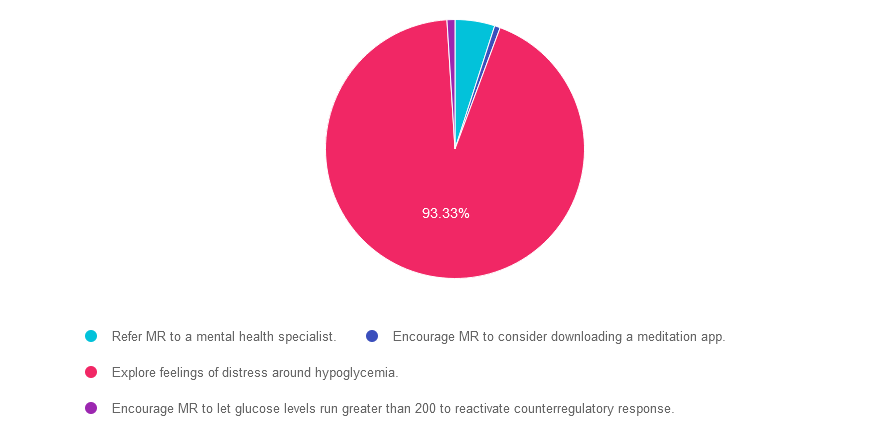
Getting to the Best Answer
If you are thinking about taking the certification exam, this practice test question will set you up for success. Test writers anticipate possible answers based on the details in the question. They will wave those “juicy answers” right under your nose. Your job is to weed through the particulars, pluck out the most important elements and choose the BEST answer.
Answer 1 is incorrect. 4.69% chose this answer. “Refer MR to a mental health specialist.”
Although this answer is tempting, based on the information provided, MR doesn’t necessarily need to be referred to a mental health specialist. We expect that people with diabetes will have some degree of distress around fear of hypoglycemia. However, we can explore it further with MR and help with problem-solving to prevent hypoglycemia and make sure they have appropriate treatment strategies. If this is not successful, and MR still has on going distress, then we could consider referral to a mental health specialist with knowledge about diabetes management.
Answer 2 is incorrect. 0.71% of you chose this answer. “Encourage MR to consider downloading a meditation app.” It is true that meditation can be very helpful for people needing to decrease their stress levels. However, MR is dealing with a specific type of distress, resulting from fear of hypoglycemia. This generalized approach of suggesting a meditation app doesn’t acknowledge the distress MR is feeling specifically around hypoglycemia. Since it is not a person-centered approach, it is not the best answer.
Answer 3 is correct. About 93.33% of respondents chose this. “Explore feelings of distress around hypoglycemia.” Great job. Most of you chose this best answer! Hypoglycemia distress is real and helping people with problem-solving to prevent hypoglycemia, explore their feelings and fears, and make sure they know appropriate treatment is the best first approach. If that is not successful, referral to a mental health specialist might be indicated.
Finally, Answer 4 is incorrect. 0.99% chose this answer. “Encourage MR to let glucose levels run greater than 200 to reactivate counterregulatory response.” While it is true that people who have hypoglycemia unawareness can increase their feelings of low blood sugar by allowing their blood sugars to run a little higher, this response does not address the emotional distress MR is feeling. Plus, there is no mention that MR has hypoglycemia unawareness. For that reason, it is not the best answer.
We hope you appreciate this week’s rationale! Thank you so much for taking the time to answer our Question of the Week and participate in this fun learning activity!
Want to learn more about this question? Join our NEW
ReVive 5 Diabetes Training Program
Live Virtual Sessions July 19 & July 26th – Save $100
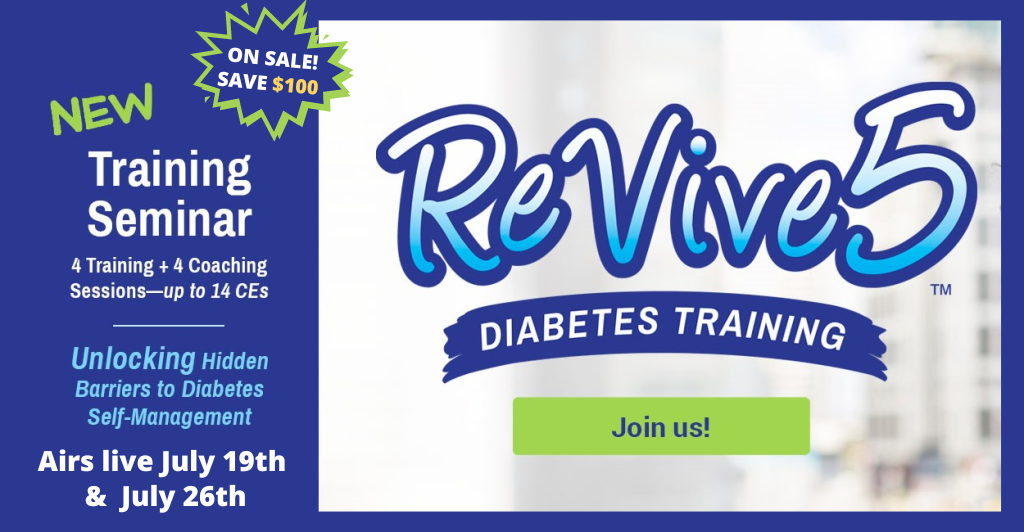
Whether you are a novice or an expert in providing diabetes care, we invite you to attend this exciting training program that provides the essential steps to address diabetes distress combined with an innovative approach to glucose management that will revolutionize your practice.
“ReVive 5” breathes new life into our relationship with diabetes, bringing a fresh perspective to both the person with diabetes and the provider.
Join A Team of Experts

Team of Experts: ReVive 5 is taught by a team of 3 Interdisciplinary Experts:
- Lawrence Fisher, Ph.D., ABPP, Professor Emeritus, UCSF
- Susan Guzman, PhD
- Beverly Thomassian, RN, MPH, CDCES, BC-ADM
Accredited Training Program:
- 14.0 CEs – Includes the 7-hour Session ReVive 5 Training Program, Certificate, and 5 FREE bonus courses to supplement content.
- A comprehensive set of assessment tools, educational materials, log sheets, and resources.
Dates and Times for ReVive Virtual Training
- For your convenience, we have combined the 4 sessions into 2 half days. Same great content.
- July 19 and 26th from 9 am to 12:30 pm PST. Space is limited, so save your space today!
Speakers Interviews – Learn more about the ReVive 5 Team
What is the Biggest Takeaway when Addressing Diabetes Distress? – Dr. Susan Guzman
Do you have to be a Mental Health Expert to Tackle Diabetes Distress? – Dr. Lawrence Fisher
Why I Transformed my Approach to Diabetes Self-Management Education- Coach Beverly
Don’t worry if you can’t make it live. Your registration guarantees access to the recorded version in the Online University.
All hours earned count toward your CDCES Accreditation Information
Sign up for Diabetes Blog Bytes – we post one daily Blog Byte from Monday to Friday. And of course, Tuesday is our Question of the Week. It’s Informative and FREE! Sign up below!
The use of DES products does not guarantee the successful passage of the CDCES exam. CBDCE does not endorse any preparatory or review materials for the CDCES exam, except for those published by CBDCE.
Empagliflozin now Approved for Peds
Rates of type 2 diabetes in youth continue to climb. Based on information from the SEARCH for Diabetes in Youth study, the incidence of type 2 diabetes in children increased by 4.8% per year from 2002 to 2015 and is expected to continue increasing. As of 2017, there were approximately 28,000 cases of type 2 diabetes in children in the U.S. By 2060, if current trends continue, that number is predicted to be approximately 220,000, with the majority of cases occurring in minority racial and ethnic groups such as Non-Hispanic Black people and Hispanic people.

Pediatrics have limited medication options:
Compared to adults, children with type 2 diabetes have limited medication treatment options even though type 2 diabetes generally progresses more rapidly in youth. Metformin was the only oral medication approved for children 10 years and older until last month.
In late June, the U.S. Food and Drug Administration approved Jardiance (empagliflozin) and Synjardy (empagliflozin and metformin hydrochloride) as additions to diet and exercise to improve blood sugar management in children 10 years and older with type 2 diabetes. These approvals provide a new class of medicines to treat pediatric diabetes, in addition to the handful of other FDA-approved medications including; metformin, liraglutide, semaglutide, exentatide XR and insulin therapy.
Trials show significant glucose improvement
The safety and efficacy of empagliflozin in children were studied in a double-blind, randomized, placebo-controlled trial in 157 patients aged 10 to 17 years with inadequately controlled type 2 diabetes.
Results from the DINAMO phase III trial, in which Jardiance demonstrated a statistically significant reduction in the primary endpoint of change from baseline in A1c at 26 weeks compared with placebo in participants aged 10-17 years with type 2 diabetes. When added to other baseline treatments (diet, exercise, metformin, and/or insulin), Jardiance 10 mg and 25 mg pooled doses reduced A1c by 0.84% compared with placebo at week 26.
Common side effects in children treated with empagliflozin were generally similar to those reported in adults, except there was a higher risk of hypoglycemia among pediatric patients 10 years and older taking empagliflozin compared to placebo, regardless of whether they were taking other therapies for diabetes.
Not recommended for people with Type 1 Diabetes
Jardiance and Synjardy are not recommended in patients with type 1 diabetes because of an increased risk of diabetic ketoacidosis. Jardiance and Synjardy are also not recommended for use to improve blood sugar control in patients with severe kidney problems and should not be used in patients who previously have had a serious allergic reaction to them. Synjardy must not be used in patients with metabolic acidosis or diabetic ketoacidosis (increased ketones in the blood or urine).
Jardiance and Synjardy received priority review designations. A priority review designation directs overall attention and resources to the evaluation of applications for drugs that, if approved, would be significant improvements in the safety or effectiveness of the treatment, diagnosis or prevention of serious conditions.
Medication PocketCards Updated to Reflect this change
We have updated our ePocketCards with the new approval and plan to go to press this month to update our printed version too. We will keep you posted!
Want to learn more about this practice question?
Join us LIVE in San Diego for our DiabetesEd Training Conference
October 11-13th, 2023

Two Registration Options
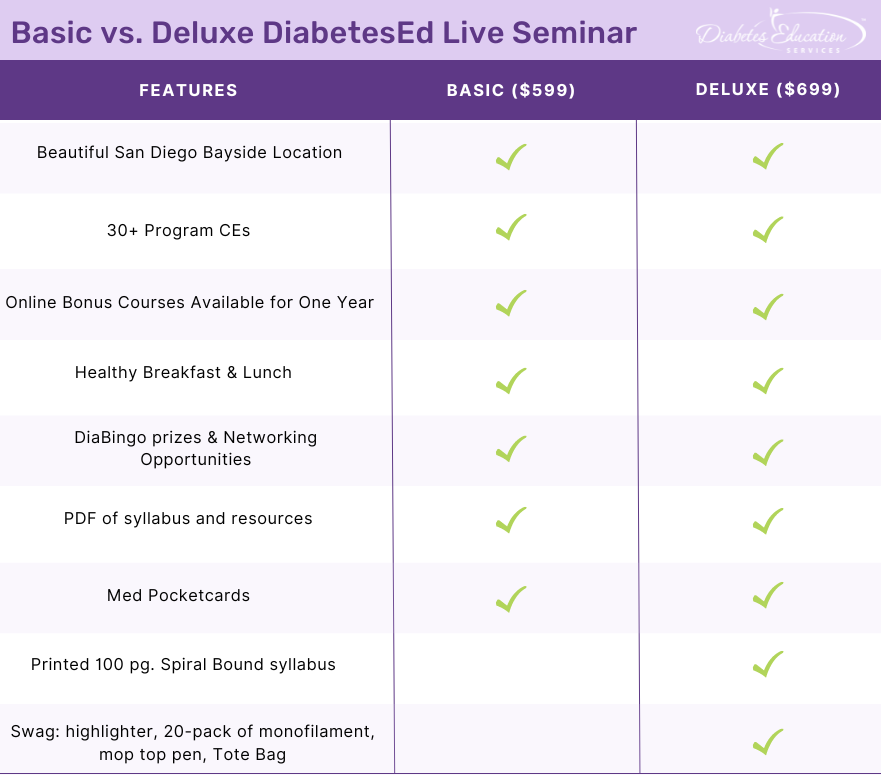
Join Coach Beverly and Team for two and a half days of knowledge-sharing, fun, networking, games with prizes, and “aha” moments in beautiful San Diego.
You don’t want to miss this one-of-a-kind learning opportunity. Get away from all those daily responsibilities and immerse yourself in a fun and intensive conference with plenty of networking opportunities.
Attendees will leave this conference with new tools and a more complete understanding of the latest advances in diabetes care, from medications to technology to Medical Nutrition Therapy!
Bring your colleagues and enjoy our friend discount.
Our team expertly translates the complex science of diabetes into understandable terms while keeping it real, practical, and fun.
Team of expert faculty includes:
- Diana Isaacs, PharmD, BCPS, BC-ADM, BCACP, CDCES – Educator of the Year, 2020
- Coach Beverly Thomassian, RN, MPH, CDCES, BC-ADM
- Ashley LaBrier, MS, RD, CDCES, Diabetes Program Coordinator
All hours earned count toward your CDCES Accreditation Information
Sign up for Diabetes Blog Bytes – we post one daily Blog Byte from Monday to Friday. And of course, Tuesday is our Question of the Week. It’s Informative and FREE! Sign up below!
The use of DES products does not guarantee the successful passage of the CDCES exam. CBDCE does not endorse any preparatory or review materials for the CDCES exam, except for those published by CBDCE.
Updated PocketCards Ready for Shipping
Great News. Our updated PocketCards just arrived in time for this newsletter! We are excited to share this latest printed version of our world-famous Medication and Insulin Pocketcards and let you know they are ready for ordering. You can purchase them one at at time or we offer quantity discounts too. We also have a PocketCard Bundle that includes the Meds PocketCard, ADA Standards & Foot PocketChart, plus a FREE sticker.
Our eight-sided medication accordion Pocketcards were designed by Coach Beverly Thomassian as a tool for clinical practice and exam preparation. One of our best sellers, the Diabetes Medication PocketCard is perfect for any health care professional providing diabetes care. Also a great gift for colleagues and staff.
Updates in these PocketCards Include:
- Indicated new Pediatric approval for empagliflozin (Jardiance) and dulaglutide (Ozempic) for ages 10 and older.
- Deleted the DPP-IVi Saxagliptin (Onglyza) & Kombiglyze XR (saxagliptin/metformin XR) since permanently discontinued.
Download for FREE or Order Laminated Pocketcards Here
Get all of our Best-Selling Pocketcards in One Bundle!
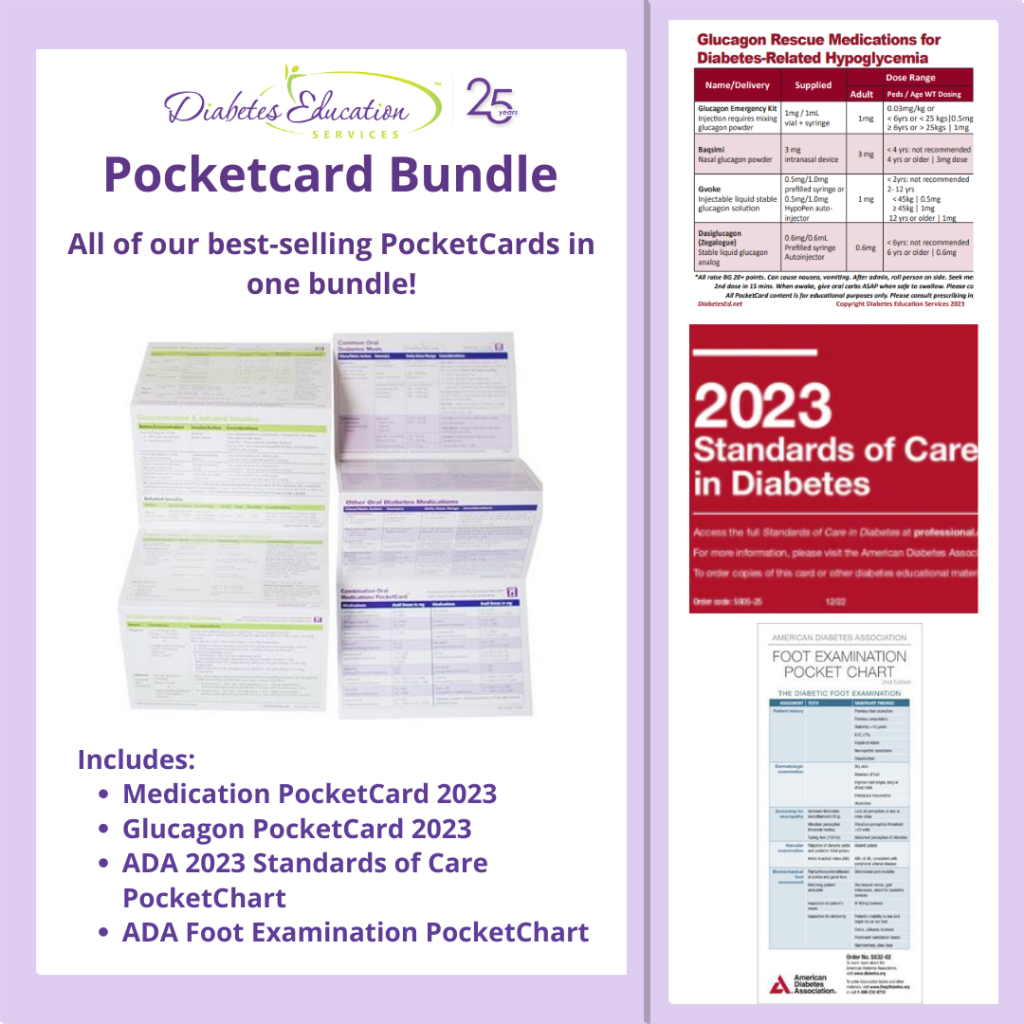
Now all of our best-selling PocketCards are all in one bundle. This is an excellent bundle to assist in clinical practice and exam preparation.
This bundle includes:
- Medication PocketCard 2023
- Glucagon PocketCard 2023
- ADA 2023 Standards of Care PocketChart
- ADA Foot Examination PocketChart
Now available!
ADCES released a new edition of the Certification Review Guide
This 6th edition contains over 475 practice questions
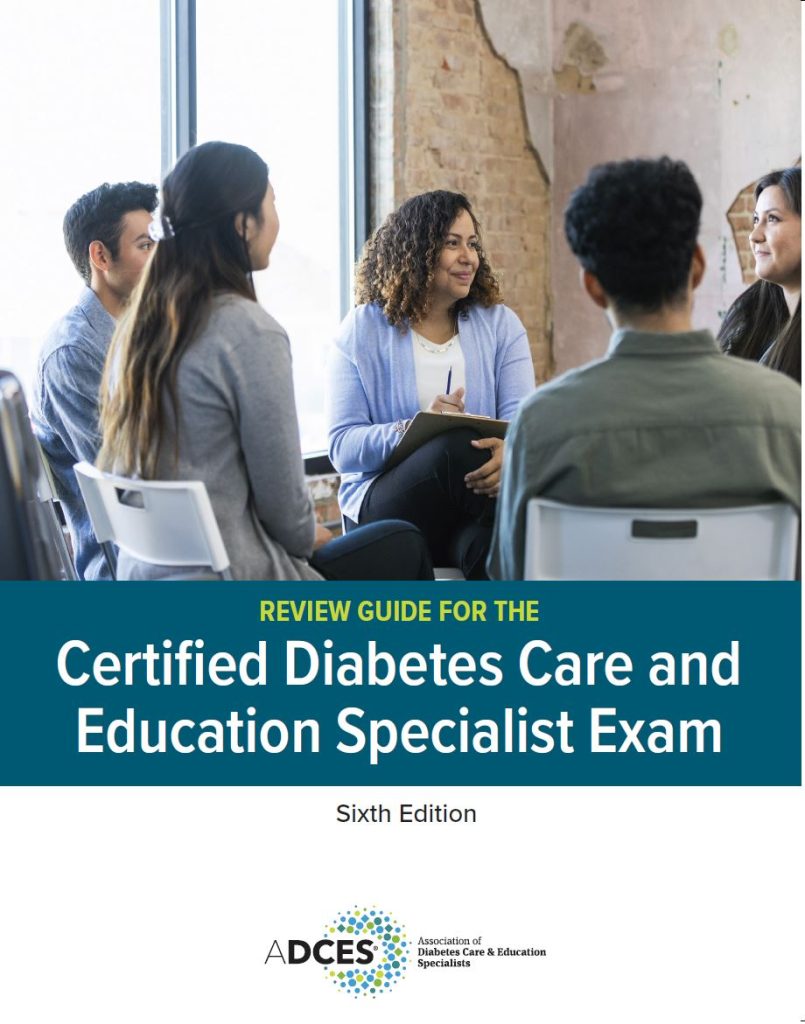
This guide reflects the ADA Standards of Care, newer medications, and technologies.
The ADCES Review Guide is a fantastic independent study tool and comprehensive resource for the Diabetes Care and Education Specialist Exam and the BC-ADM Exam.
The 6th Edition Updates provides:
- 475+ multiple-choice questions
- Strategies for preparing for and taking the exam
- Updates based on the ADA Standards of Care for 2023
Sign up for Diabetes Blog Bytes – we post one daily Blog Byte from Monday to Friday. And of course, Tuesday is our Question of the Week. It’s Informative and FREE! Sign up below!
The use of DES products does not guarantee the successful passage of the CDCES exam. CBDCE does not endorse any preparatory or review materials for the CDCES exam, except for those published by CBDCE.
Rationale of the Week | Pregnancy & Diabetes Medication

For last week’s practice question, we quizzed participants on gestational diabetes & medication. A whopping 70% of respondents chose the best answer – great job. We want to clarify and share this important information, so you can pass it on to people living with diabetes and your colleagues, plus prepare for exam success!
Before we start though, if you don’t want any spoilers and haven’t tried the question yet, you can answer it below: Answer Question
Question: AR has PCOS and type 2 diabetes and is in shock because they just discovered they are 6 weeks pregnant. AR takes metformin 1000mg BID plus empagliflozin (Jardiance) 25 mg and their most recent A1C is 8.6%.
Which of the following actions do you recommend?
Answer Choices:
- Stop empagliflozin
- Stop metformin, keep empagliflozin
- Stop metformin and empagliflozin, start insulin.
- Stop empagliflozin, start a GLP-1 inhibitor
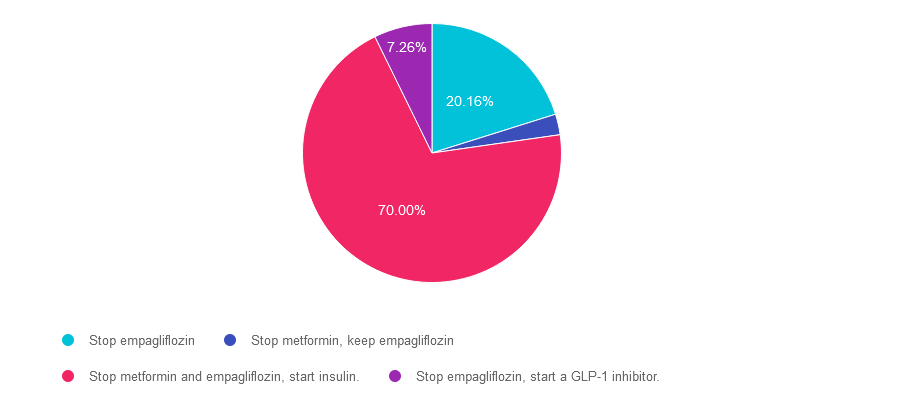
Getting to the Best Answer
If you are thinking about taking the certification exam, this practice test question will set you up for success. Test writers anticipate possible answers based on the details in the question. They will wave those “juicy answers” right under your nose. Your job is to weed through the particulars, pluck out the most important elements and choose the BEST answer.
Answer 1 is incorrect. 20.16% chose this answer. “Stop empagliflozin.” It is true that empagliflozin and all SGLT-2’s are not indicated during pregnancy. However, there is a better answer given that her A1C of 8.6% is above the pregnancy target of less than 6.5%.
Answer 2 is incorrect. 2.58% of you chose this answer. “Stop metformin, keep empagliflozin.” Empagliflozin and all SGLT-2’s are contraindicated during pregnancy, so this answer is not the best choice.
Answer 3 is correct. About 70% of respondents chose this. “Stop metformin and empagliflozin, start insulin.” GREAT JOB. Given that her A1C of 8.6% is above the pregnancy target of less than 6.5%, insulin absolutely needs to be started to get glucose to goal. According to the ADA Standards, the provider may opt to continue the metformin treatment for PCOS for the first trimester But given the urgent need to get blood glucose to target, this individual will be most effectively managed with a combination of nutrition therapy and insulin.
Finally, Answer 4 is incorrect. 7.26% chose this answer. “Stop empagliflozin, start a GLP-1 inhibitor.” Yes, we need to stop empagliflozin since all SGLT-2’s are contraindicated during pregnancy. However, GLP-1 Inhibitors are also contraindicated during pregnancy, so this answer is incorrect.
We hope you appreciate this week’s rationale! Thank you so much for taking the time to answer our Question of the Week and participate in this fun learning activity!
Want to learn more about this question? Enroll in our
Level 2 | Pregnancy & Diabetes
Pregnancy with diabetes is confronted with a variety of issues that require special attention, education, & understanding. This course reviews those special needs while focusing on Gestational Diabetes & Pre-Existing Diabetes. Included are the most recent diagnostic criteria, management goals, & prevention of complications during pregnancy. This is a helpful review for Certification Exams & those who want more information on people who are pregnant & live with diabetes.
Objectives:
- List three issues that affect pregnancy with diabetes.
- Describe the unique attributes of pre-existing diabetes in pregnancy & gestational diabetes.
- State the diagnostic criteria & management goals for gestational diabetes.
- Potential short-term & long-term complications of fetal exposure to hypoglycemia.
- Prevention measures to keep mother & baby healthy.
Intended Audience: A great course for healthcare professionals seeking to enhance their knowledge of the issues surrounding pregnancy and diabetes and appropriate care to improve outcomes.
Level 2 | Hospitals & Hyperglycemia
Research clearly demonstrates the importance of glucose control during hospitalization to improve outcomes not only in the inpatient setting but after discharge. This course reviews the evidence that supports inpatient glucose control & outlines practical strategies to achieve targets in the inpatient setting. We incorporate the latest American Diabetes Association’s (ADA) Standards of Medical Care in Diabetes & provide links to resources & inpatient management templates.
Objectives:
- Describe the impact of hyperglycemia in the hospital setting.
- Discuss the importance of inpatient glucose control.
- List three strategies to get glucose to goal in the hospital setting.
Intended Audience: A great course for healthcare professionals seeking strategies to manage and improve inpatient diabetes care.
Question of the Week | Diabetes & Hospital Standards

JR was admitted to the hospital with an infection and newly discovered diabetes. To get glucose to ADA target range for hospitalized individuals, JR was started on 12 units of basal insulin plus bolus insulin with meals. JR experienced a morning BG of 87 mg/dL, so the provider decreased the basal insulin to 9 units. JR’s morning blood sugar the next day was 157 mg/dL.
What is the best action?
- Increase basal insulin by 10- 20%.
- Intensify correction scale.
- Continue with same basal dose.
- Ask MS if they are snacking during the night before making adjustments.
Click Here to Test your Knowledge
Want to learn more about this question? Enroll in our
Level 2 | Hospitals & Hyperglycemia | 1.5 CEs
Research clearly demonstrates the importance of glucose control during hospitalization to improve outcomes not only in the inpatient setting but after discharge. This course reviews the evidence that supports inpatient glucose control & outlines practical strategies to achieve targets in the inpatient setting. We incorporate the latest American Diabetes Association’s (ADA) Standards of Medical Care in Diabetes & provide links to resources & inpatient management templates.
Objectives:
- Describe the impact of hyperglycemia in the hospital setting.
- Discuss the importance of inpatient glucose control.
- List three strategies to get glucose to goal in the hospital setting.
Intended Audience: A great course for healthcare professionals seeking strategies to manage and improve inpatient diabetes care.
Rationale of the Week | AR is pregnant and Worried

For last week’s practice question, we quizzed participants on gestational diabetes & pregnancy complications. 68% of respondents chose the best answer. We want to clarify and share this important information, so you can pass it on to people living with diabetes and your colleagues, plus prepare for exam success!
Before we start though, if you don’t want any spoilers and haven’t tried the question yet, you can answer it below: Answer Question
Question: AR has PCOS type 2 diabetes and worried because they just discovered they are 6 weeks pregnant. AR takes metformin 1000mg BID plus empagliflozin (Jardiance) 25 mg and their most recent A1C is 8.6%.
Which of the following is a potential complication associated with hyperglycemia during the first 10 weeks of pregnancy?
Answer Choices:
- Intrauterine hypoglycemia
- Macrosomia and post-natal jaundice
- Neonatal respiratory distress
- Diabetic embryopathy
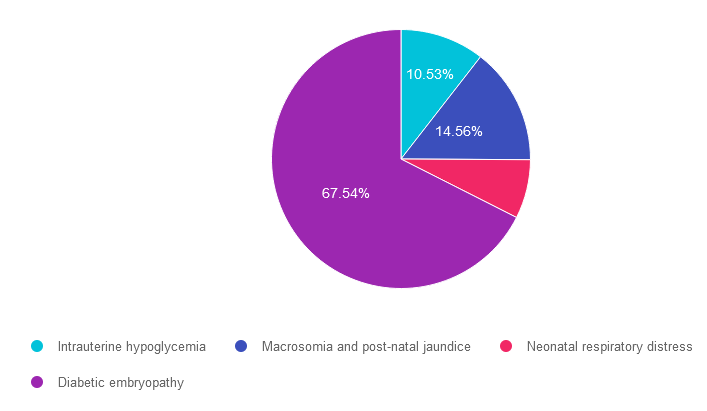
Getting to the Best Answer
If you are thinking about taking the certification exam, this practice test question will set you up for success. Test writers anticipate possible answers based on the details in the question. They will wave those “juicy answers” right under your nose. Your job is to weed through the particulars, pluck out the most important elements and choose the BEST answer.
Answer 1 is incorrect. 10.53% chose this answer. “Intrauterine hypoglycemia.” Although this answer is tempting, it is not accurate. If the fetus experienced elevated blood sugars (from mom) during gestation, this stimulates increased fetal production of insulin. After delivery, baby’s who were exposed to intrauterine hyperglycemia are at higher risk of post-delivery hypoglycemia (not intrauterine hypoglycemia).
Answer 2 is incorrect. 14.56% of you chose this answer. “Macrosomia and post-natal jaundice.” Although this answer is tempting, it is not accurate. If the fetus experienced elevated blood sugars (from mom) during their first 10 weeks of gestation, this stimulates increased fetal production of insulin and can stimulate extra fat stores later in pregnancy leading to larger babies and higher risk for post delivery jaundice. However, the question is asking, what complications can elevated blood sugars cause during their first 10 weeks of pregnancy when the organs are developing?
Answer 3 is kind of incorrect. About 7.37% of respondents chose this. “Neonatal respiratory distress.” The question is asking, if the fetus experienced elevated blood sugars (from mom) during the first 10 weeks of gestation, what complications can elevated blood sugars cause during the first trimester pregnancy when the organs are developing? The lungs can be affected by first trimester hyperglycemia, causing the newborn to struggle with respiratory distress.
Finally, Answer 4 is correct. 67.54% chose this answer. “Diabetic embryopathy.” GREAT JOB. This is the best answer. If the fetus experienced elevated blood sugars (from mom) during the first 10 weeks of gestation, embryonic complications result from elevated blood sugars during the first trimester pregnancy when the organs are developing. These can include, congenital heart disease, renal anomalies and caudal regression.
We hope you appreciate this week’s rationale! Thank you so much for taking the time to answer our Question of the Week and participate in this fun learning activity!
Want to learn more about this question? Enroll in our
Level 2 | Pregnancy & Diabetes
Pregnancy with diabetes is confronted with a variety of issues that require special attention, education, & understanding. This course reviews those special needs while focusing on Gestational Diabetes & Pre-Existing Diabetes. Included are the most recent diagnostic criteria, management goals, & prevention of complications during pregnancy. This is a helpful review for Certification Exams & those who want more information on people who are pregnant & live with diabetes.
Objectives:
- List three issues that affect pregnancy with diabetes.
- Describe the unique attributes of pre-existing diabetes in pregnancy & gestational diabetes.
- State the diagnostic criteria & management goals for gestational diabetes.
- Potential short-term & long-term complications of fetal exposure to hypoglycemia.
- Prevention measures to keep mother & baby healthy.
Intended Audience: A great course for healthcare professionals seeking to enhance their knowledge of the issues surrounding pregnancy and diabetes and appropriate care to improve outcomes.
Level 2 | Hospitals & Hyperglycemia
Research clearly demonstrates the importance of glucose control during hospitalization to improve outcomes not only in the inpatient setting but after discharge. This course reviews the evidence that supports inpatient glucose control & outlines practical strategies to achieve targets in the inpatient setting. We incorporate the latest American Diabetes Association’s (ADA) Standards of Medical Care in Diabetes & provide links to resources & inpatient management templates.
Objectives:
- Describe the impact of hyperglycemia in the hospital setting.
- Discuss the importance of inpatient glucose control.
- List three strategies to get glucose to goal in the hospital setting.
Intended Audience: A great course for healthcare professionals seeking strategies to manage and improve inpatient diabetes care.



